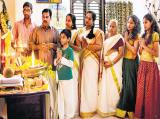Family time
The New Year is a special day for everyone and the City has been bustling with activities as different communities celebrated festivities with their families this week. Bengalureans are prepared to bring in the New Year on ‘Vishu’ and ‘Bihu’, which fall today, with both communities excited about the year ahead.

While the young are excited about the family gatherings and shopping, the adults are excited about the festivities. On ‘Vishu’, the ‘Vishukanni’ plays a major role, says Sindhu Padmakumar. She details, “The ‘Vishukanni’ comprises different elements like fruits, cucumber, pulses, cereals, gold, coins and the ‘kannikonna’ flower. A ‘vaalkanadi’ inside a ‘kindi’ is also placed along with ‘mundu’ as a part of the ‘kanni’.” Sindhu says that all these items are placed around Lord Krishna’s idol, which is the first thing one sees on the day.
“The woman of the family prepares the ‘kanni’ the night before, and brings the other family members one by one to see this sight, early next morning. This sight is believed to bring blessings in all the fields throughout the year,” says Sindhu.
Anjali, an engineering student, says that she awaits the day with excitement. “And at the end of the day, I wish that it wouldn’t end. A grand feast and loads of family time is what Vishu is all about,” she says. She says that new clothes and ‘kaineetam’ are the most exciting parts of the day. “Also, the ‘kanni’ itself is something we wait for. Even if I’m awake, I wait patiently for my mother to come and take me to it. There is also the anxiety of seeing whether the ‘kanni’ is better than the last time,” she says with a smile.
Giving ‘kaineetam’ is another big part of Vishu. Hemalatha Prakash says that it is an essential part of the day and symbolically means that one’s life will be blessed with wealth and prosperity. “The elders of the family give ‘kaineetam’ (which means giving money) to the younger lot, so as to give them monetary blessings. Words like ‘kai nirachu kittate’ (meaning may you blessed with more) are uttered during this. Usually my grandmother, who stays with us, gives everyone the ‘kaineetam’,” she says. Hemalatha adds that earlier silver coins used to be given away but nowadays it has advanced to rupee notes.
The festivities remain the same and a grand feast is cooked for the day. “Traditionally, the ‘Vishu Kanji’ is made on this day. The festivities include an elaborate ‘Vishu sadya’ like Onam, where different dishes are prepared like rice, ‘sambhar’, ‘achar’, ‘injipulli’, ‘avial’, ‘thoran’, ‘erusheri’ and ‘pacchadi’. Nowadays, it is more about what can be made, so anything that can be prepared becomes a part of the feast,” says Sangeetha Vipin. She adds that the festival also includes bursting fireworks traditionally, but many don’t do that in Bengaluru.
Celebrated by the Assamese diaspora, ‘Bihu’, which falls on the same day has its own festivities to it. This ‘Bihu’ is called ‘Rongali Bihu’, which comprises colours, dance and festivities. “The festivities include ‘Goru Bihu’ on April 14, where cows are washed and fed properly in the villages. ‘Manuh Bihu’ will be celebrated on April 15, where we wear new clothes and also gift new clothes to our relatives. It can be the ‘gamocha’, which is a valued gift, and also the ‘chadar’,” says Manjula Gogoi, a young professional.
She adds that the day is about unlimited food. “Of the mouth-watering food cooked for the day, the specialities includes ‘fish fry’ and ‘duck curry’ and an authentic drink made from rice,” she says. Priyam Bortamuli, brand manager with Fortis Hospitals, says, “The final day of the Bihu celebrations is today. We celebrate it in grand style with meeting families and gatherings. Back home, there are lots of public events which are held on the day. My in-laws are in town, and thus it will be a fun family affair.”
source: http://www.deccanherald.com / Deccan Herald / Home> Supplements> MetroLife / by Tini Sara Anien / DHNS – April 15th, 2015